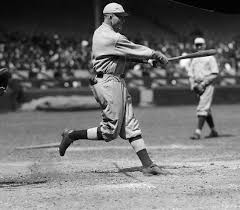Rogers Hornsby, who averaged .400 over five years, was facing a rookie pitcher who threw three pitches that he thought were strikes but that the umpire called balls. The rookie shouted a complaint to the umpire, who replied: “Young man, when you throw a strike, Mr. Hornsby will let you know.”
The above passage about the great St. Louis Cardinals’ hitter of a century ago, Rogers Hornsby, is from this 2007 column by George Will. It is one of the few sports stories that I dare to use as a metaphor for markets.
 In markets, producers make offers to consumers – offers that consumers are free to accept or to reject. If offerings made by a producer are liked by consumers well enough to prompt them to pay prices high enough for what that producer is offering, that producer profits and prospers for as long as the offerings it makes to consumers are judged by consumers to be worthwhile. In contrast, if offerings made by a producer are not liked well enough by consumers – if, we might say, consumers choose not to ‘take a swing’ at accepting that producer’s offerings – that producer must improve its offerings.
In markets, producers make offers to consumers – offers that consumers are free to accept or to reject. If offerings made by a producer are liked by consumers well enough to prompt them to pay prices high enough for what that producer is offering, that producer profits and prospers for as long as the offerings it makes to consumers are judged by consumers to be worthwhile. In contrast, if offerings made by a producer are not liked well enough by consumers – if, we might say, consumers choose not to ‘take a swing’ at accepting that producer’s offerings – that producer must improve its offerings.
Such choices belong exclusively to consumers.
The charm and captivating twist of the story related above by George Will lies in the umpire’s recognition not only that a great hitter knows a solid offering by a pitcher when that hitter sees one, but that the judgment of such a hitter should not be overridden even by someone in an officiating capacity. If a pitcher’s offering is in the strike zone, a great hitter will swing at it. If a great hitter chooses not to swing at a particular offering by a pitcher, wisdom suggests that that particular offering missed the strike zone even though some third party might judge otherwise. There’s no need, in such cases, for balls and strikes to be called even by an umpire, and certainly not by the pitcher.
Obviously, baseball would be a sport productive of no value if its rules gave to pitchers the right to decide if each particular pitch is a strike or a ball – that is, the right to decide if each particular pitch is acceptable or unacceptable to the batter. Likewise, markets would be economic systems productive of no value if its rules gave to producers the right to decide if each particular product offering is acceptable or unacceptable to consumers.
As in the above story of Rogers Hornsby with respect to pitches, in free markets consumers are the ultimate judges of whether or not any offering by a producer is acceptable. Yet protectionists, nanny-staters, and industrial-policy advocates are among those who believe the contrary – namely, that the right to decide whether or not any offering by a producer is acceptable belongs not to consumers but, rather, to producers.
Protectionists, nanny-staters, and industrial-policy advocates of course mask their disdain for the judgment of consumers by proposing that the ultimate judgment of whether or not consumers should accept any particular offering by producers be given to neutral umpires – that is, to government officials. But even if (contrary to reason and experience) government-employed ‘umpires’ were in such matters unbiased, deeply informed, clear-eyed, and ‘scientific,’ these umpires would still not be remotely as well-placed as is each consumer to determine the legitimacy of any particular offering by a producer.
Like all metaphors, the one I use here isn’t perfect. In baseball, neutral umpires are necessary to stand ready to make the call on whether or not each pitch is one that the person to whom the pitch is made ‘should’ have or ‘shouldn’t’ have treated that pitch as acceptable. But in markets for goods and services the production or consumption of which carry no serious risks of imposing physical harm on innocent third parties, no such neutral umpire is necessary to make such calls: the judgment of consumers is both necessary and sufficient.



